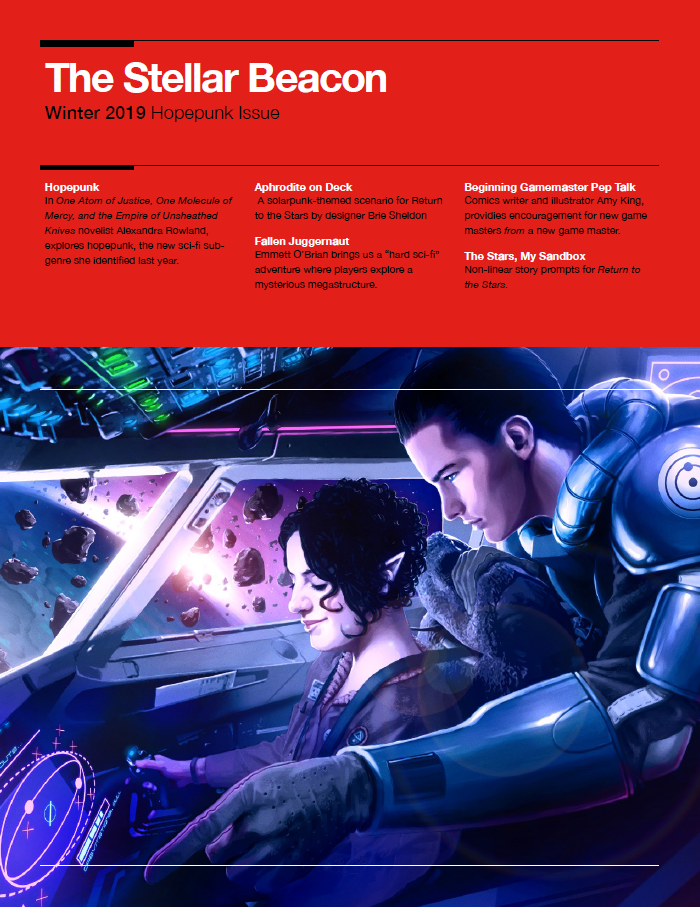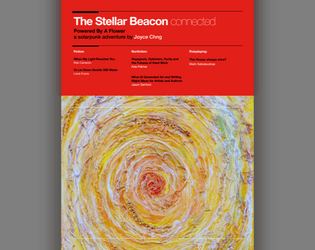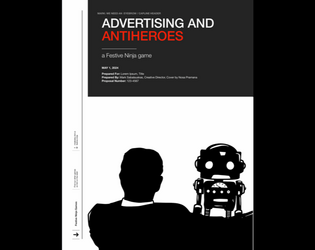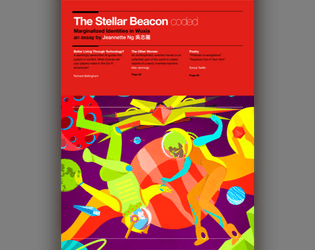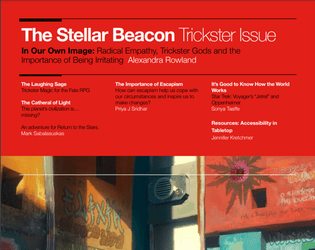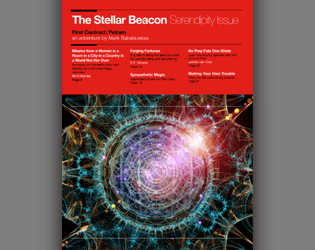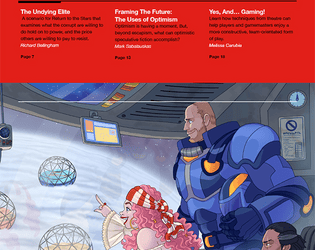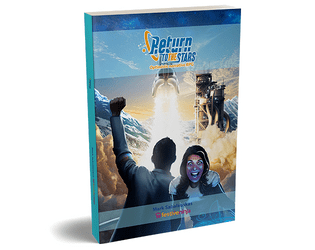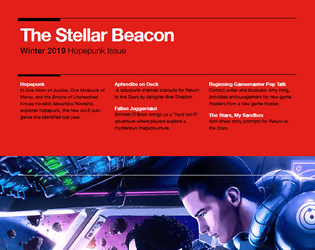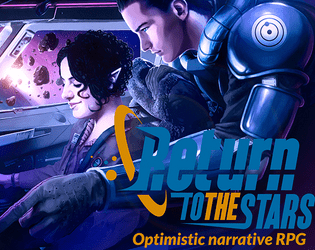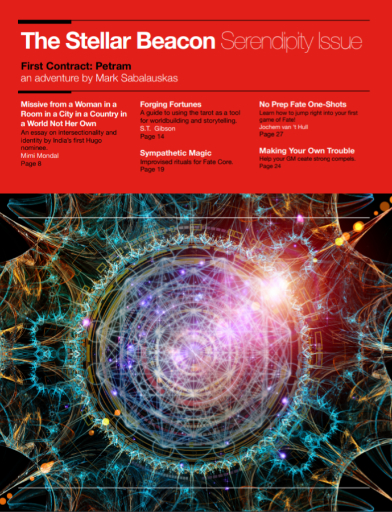The 6th issue of the Stellar Beacon ‘zine is out.
There are two story focused space opera scenarios for my powered by Fate RPG Return to the Stars.
Powered by a Flower is a solarpunk adventure, with the added fun of werewolves in space! By Joyce Chng.
The House Always Wins? Is a cyberpunk mystery for hopepunk heroes that I wrote.
There is also original science fiction: When My Light Reaches Youby Rob Cameron and To Lie Down Beside Still Waters by Louis Evans.
And some cool essays. Hopepunk, Optimism, Purity and the Futures of Hard Work by Ada Palmer, two-time Hugo finalist and historian focusing on the history of censorship and radical thought. What AI Generated Art and Writing Might Mean for Artists and Authors by Jason Sanford, four-time finalist for the Nebula Award, three-time finalist for the Hugo Award for Best Fan Writer.
The cover painting is a digital scan of an acrylic painting called Coriolis I by Regina Valluzzi, "the nerdly painter". which she describes as "a set of playful experiments in the viscoelastic properties of acrylic gel and liquid media." I think a digital scan of such a robustly physically embodied work concerned with a scientific abstraction of a real-world phenomenon is in interesting conversation with Jason’s essay.
Why not check it out!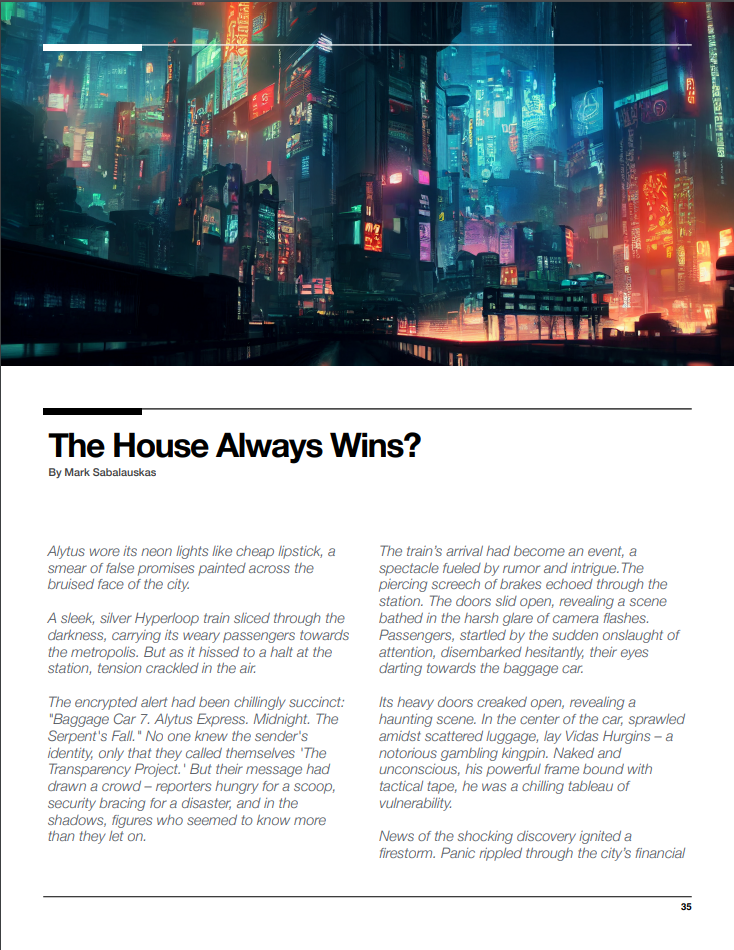
Festive Ninja
Creator of
Recent community posts
I’ve a new game out. In Advertising and Antiheroes you create stories about fascinating, flawed people who work at an ad agency.
It is for people who enjoy prestige dramas like Mad Men, cyberpunk tales about corporate sellouts, or the period pleasures of novels like Dorothy Sayers’ golden age mystery Murder Must Advertise. There are setting prompts for the 1920s, 1960s, and a dystopian future.
Advertising and Antiheroes is in the tradition of lightweight storytelling games like For the Queen or Fiasco.
Get the newest game from an award-nominated designer for only $2, more affordable than a few sips from a latte. Act now, supplies are unlimited!
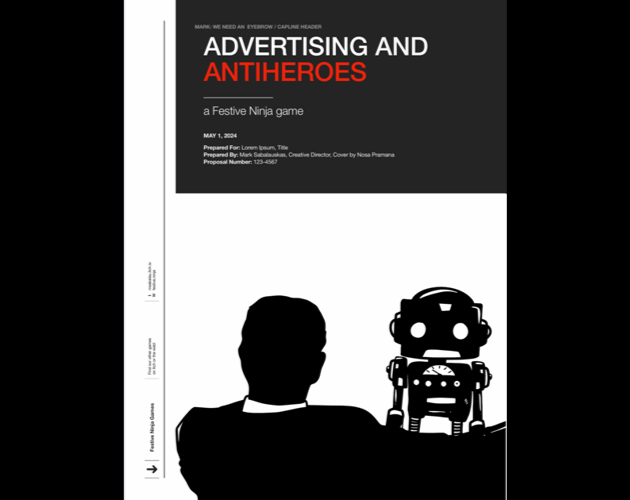
d
I have some full color hardcover print on demand physical copies available, I take them to conventions, and sent them to Kickstarter backers. I'd be happy to sell you a copy, you can e-mail me at mark@festive.ninja for details. (If you buy a physical copy, I'd be happy to give you a digital copy too.) Obviously the digital copy is more affordable than a print on demand copy, but I know some people really like a book they can hold in their hands.
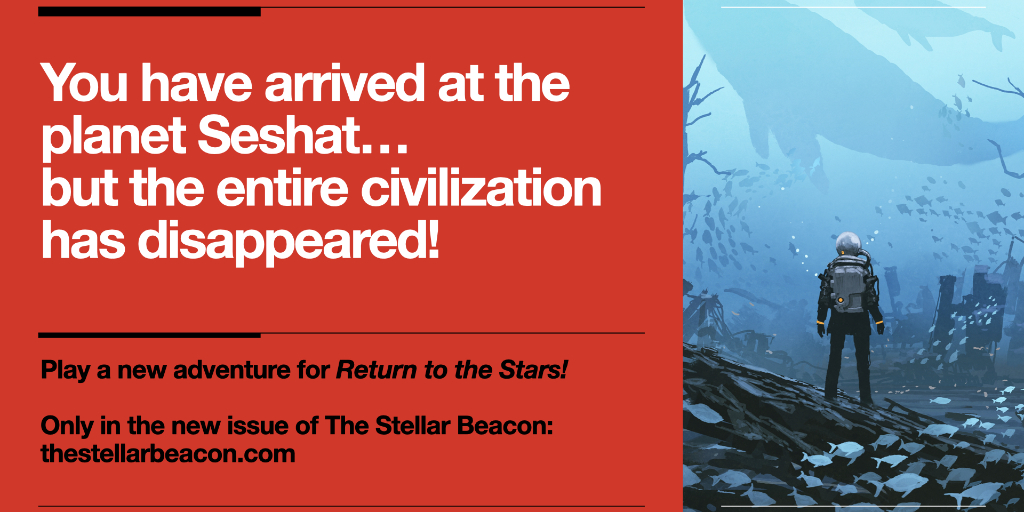
Very pleased to announce that the fourth issue of The Stellar Beacon is out, now out featuring: with Trickster magic for the Fate RPG, a new space opera Adventure for Return to the Stars, streamer (and Wizard's Candlekeep Mysteries designer) Jen Kretchmer introduces her extensive set of accessibility resources tabletop gamers, and three really cool essays by two acclaimed SFF authors and a new author with a novel out this summer. Check it out!
Icebreaker is a micro RPG where you play newcomers to science station on a frozen planet. It is designed, literally, as an ice breaking game that you can play to make new acquaintances while you are attending a gaming or SFF convention. The game PDF is formatted with margins and bleed so that you can have Moo or another printing service print the game on a standard business card, so you have the option of affordably printing a large number of copies, and creating a improv micro LARP at your event. Of course, your can simply download the game, and play five minute game with friends, perhaps as you are waiting for a late player to arrive for you tabletop roleplaying game.
Icebreaker was created as part of the Pleasure-not-Business Card RPG Jam.
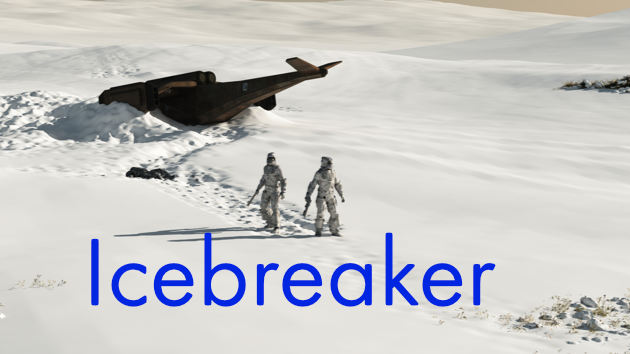 I
I
I miss going to cons. So I created a free story creation game about them. Simple to play, you just read story prompts aloud, so you can hang out with your friends on Discord and co-create a cozy futuristic vison. Like if Miyazaki made a “slice of life” sci-fi anime about congoing.
Get your free copy.
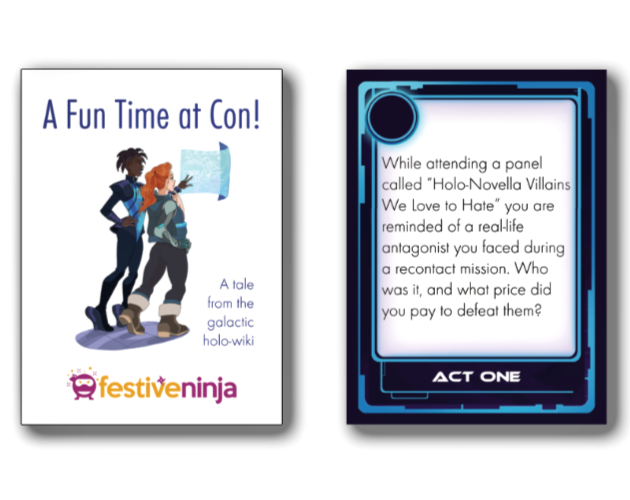
The Stellar Beacon: Serendipity Issue features:
First Contract: Petram Explore what happens when the first outsiders in over a century visit a thriving world of religious experimentalists, in this adventure for the space opera RPG Return to the Stars.
Missive from a Woman in a Room in a City in a Country in a World Not Her Own An updated essay by India’s first Hugo nominee, Mimi Mondal.
Forging Fortunes Novelist S.T. Gibson shows you how you can employ the Tarot as a tool for world building and storytelling.
Sympathetic Magic A complete guide for a Fate magic system based on symbols and relationships between things and concepts. With rules for magical actions that characters can undertake in timebound conflicts to powerful rituals that can take campaign arcs to complete.
Making Your Own Trouble Check to see if your Fate character has strong double sided aspects that can be compelled.
No Preparation Fate Accelerated One-Shots Jochem van 't Hull shares his tested method for a fun, zero-prep Fate adventures-even if your players have never played the game before!
Enjoy a zine today!
The Stellar Beacon is a zine that supports the sci-fi RPG Return to the Stars with new adventures and which also explores the gamer and geek culture more broadly. 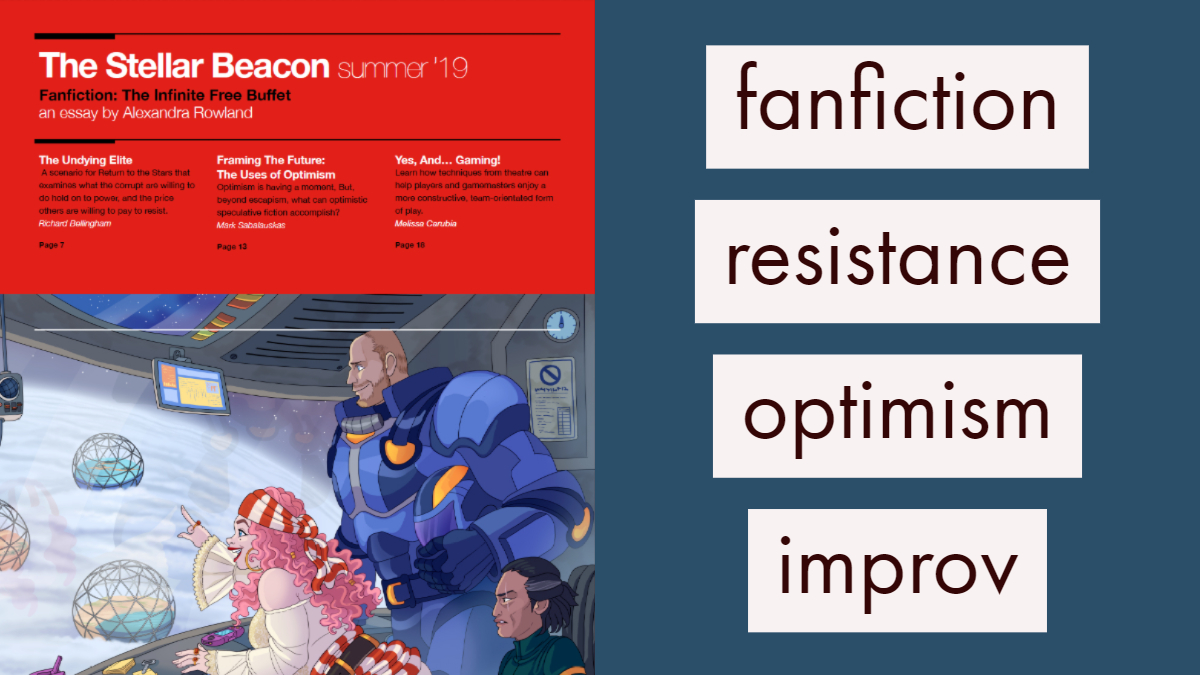
This issue includes:
Fanfiction: The Infinite Free Buffet
2019 Hugo nominee Alexandra Rowland celebrates fanfiction, explores its significance, and defends it against it against those who shallowly dismiss it.
The Undying Elite
A scenario for Return to the Stars that examines what the corrupt are willing to do hold on to power, and the price others are willing to pay to resist.
Richard Bellingham is the author of the RPG The Secret of Cats, and creative director of The Fate Horror Toolkit.
Yes, And… Gaming!
Learn how techniques from theatre can help players and gamemasters enjoy a more constructive, team-orientated form of roleplaying.
Melissa Carubia is a music director, composer, and actor making art and music in the Boston area.
Framing the Future: the uses of Optimism
Optimism is having a moment, But, beyond escapism, what can optimistic speculative fiction accomplish? Mark Sabalauskas, designer of Return to the Stars, delves into one of the game’s core themes.
Pop Culture Parade
A collection of entertainment the themed sci-fi sandbox story prompts for Return to the Stars!
Grab the new issue of The Stellar Beacon with our 25% off launch sale!
It looks like Itch has significant summer sale coming up. Anyone else planning to participate?
One of the things they mentioned was doing co-op bundles, has anyone tried that, and what was your experience? One or more tabletop RPG coop bundles might be a way to attract some attention to the increasing amount RPGs here.
Obviously people games are at different places in their games lifecycles, so one type of bundle would likely not fit everyone.
Some thoughts on pros and cons of an original system design in the TTRPG space:
Pros:
- Bespoke, so it can potentially more closely accomplish exactly what your aim is.
- Perhaps the only way to accomplish something people don't normally attempt.
- Don't have to master some other system before creating for it.
- May involve aspects of creativity and design that you find personally appealing.
- Don't have to read/understand SRD licences.
- To the extent that it's perceived as being holistically "more creative" it maybe boosts your interactions with curators of indie game fests, or contest judges.
- Slightly more likely to appeal to your peers in the indie creator community? ¯\_(ツ)_/¯
Cons
- Creating something new out the whole cloth is hard.
- Creating something new at a high quality with depth of complexity is very hard.
- Holding complexity of the end product constant, you'll still really need to add lots more playtesting.
- More effort for writing and editing.
- No built in audience who already love the system but want more stuff to do.
- A fair number of people who attempt this seem to have played very few games, and seem constrained by the paradigms of ones they have--risk of doing the extra work without achieving the benefits of bespoke originality.
The nice folk at Evil Hat provide licences to a number of SRDs, most notably including the Fate Core and Fate Accelerated Edition rules, but extending to the System Toolkit, mechanics from a bunch of games, and a portion of the 2017 Adversary Toolkit.
When sorting through this embarrassment of riches, how have you all decided what to include?
With Return, a goal was supporting episodic campaign play and, as I think approaches in FAE are more effective in one-shots and skills from Core are better for campaign play, I chose Core as the starting point, even thought that meant a lot of chopping back to hit the concision that I admire in FAE. An alternative might have been to use both licences, and build up FAE with things one liked from Core.
How have other people thought about this?
Mark (he/him)
Return to the Stars!
Hopepunk SciFi RPG where pop culture collides with political machinations to determine the fate of the galaxy.
https://msabalau.itch.io/return-to-the-stars-rpg
Return to the Stars is an optimistic science fiction RPG, powered by Fate.
I am excited to share a game with people where they can imagine having cool adventures in better future.
The direct inspiration was the sense of community that came from being surrounded by diverse, smart, and curious people at a Sci-Fi convention I attended. Hanging out with enthusiastic pop culture geeks was a real respite from much of the darkness in world. It occurred to me that the original Star Trek may have resonated because it provided a similar respite in the 60s, a very turbulent time. And that working from this optimistic place, it was a able to create a space to think more critically about society that other shows of it's era
So I created a game that combines the better parts of gamer and geek culture with science fiction exploration. Imagine if Chiana from Farscape was a genetically enhanced cosplayer, or Scotty from Star Trek was someone who loved hacking things to take to a Maker Faire.
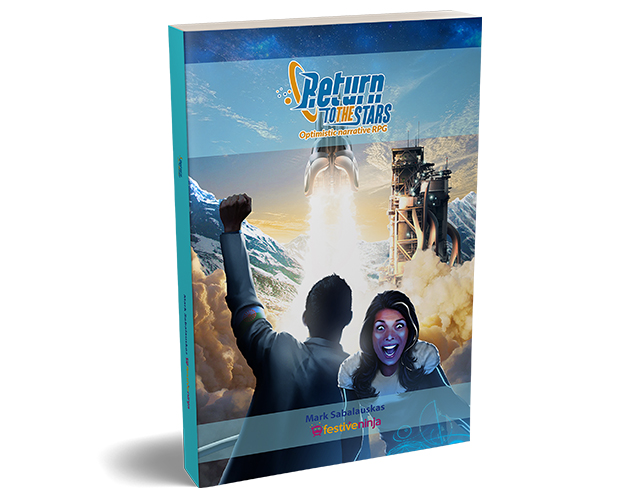
What's it about?
The basic premise is that in a post-scarcity future hyperspace travel gave easy access to countless worlds, and humanity sorted itself into like-minded communities. One such society was the Convention Authority, founded to celebrate the now classical arts of science fiction, fantasy, and gaming.
One day, without warning, the stellar beacon that illuminated hyperspace went silent rendering galactic travel impossible. The systems of the Convention Authority stayed connected thanks to a replica fleet of early starships. Now, after more than a century of effort, a long-range exploration craft has been built. Its purpose: to return to the stars and reconnect the lost civilizations of humanity.
What's hopepunk?
It's part of a new (slightly contested!) movement in speculative fiction called hopepunk.
Hopepunk is a subgenre centered around the idea that in the face of oppression and cynicism caring about things is an act of resistance. It is about being kind and also fighting against injustice.
Player characters come from a fairly utopian society. They could simply chose to stay in their post-scarcity paradise, complacent, sitting around a pool discussing seven centuries of anime and arguing if the 78th edition of D&D was the best, while robots serve them pina coladas. During character creation you have to create an aspect that explains why your character wants to leave this privilege behind. Why they are willing to put their comfort aside and risk their lives to explore and help the rest of humanity.
What's Different?
I've built some new subsystems that people can play with. I've also edited down the Core SRD to be (IMO) a bit tighter, and explained in order that I find works with people who are new to game powered by Fate. Sort of taking the skill based goodness of Core, in a FAE sized package that come with a bespoke setting, and two introductory adventures with scaffolding for the GM to learn and teach the game.
Adventures are another thing that's different than most other games powered by Fate, in that I have an ongoing effort to create more of them, in a quarterly zine. I'm breaking with the "one and done" small worldbook approach.
Let me know if you have any questions!
Hi! I'm Mark (he/him). I have a hopepunk space opera game out, powered by Fate, a 'zine to support it with ongoing adventures, and am tinkering with what might become a card game about underrecognized ways that people have driven positive change.
I like and have played in a variety of RPG, play a fair amount of tabletop board games but don't read broadly there, and dabble in video games.
Looking forward to learning about other peoples games and from each other!
Rather start with my personal mental map of "gaming" I thought it might be useful to look out at what RPG communities people joined in Google+, both because I think the self sorting gives interesting insights, and because G+ has been very important to the RPG space., and it is going away, leaving a gap. Here's a list of most of the communities over an arbitrary 2000 count. (I stopped bothering for the last maybe a dozen D&D groups I encountered)
name, subscribers
G+ Tabletop Roleplaying Games 28688
Roleplaying Games 17040
Dungeons and Dragons 15458
RPG 12167
Dungeon World Tavern 11262
Fate Core 11207
Game Master Tip 8730
Pathfinder RPG 8378
Dungeons and Dragons 5th Edition 7435
D&D 5th edition 6614
Dungeons and Dragons -DND Fans 6399
OSR 5466
Powered by the Apocalypse 4848
Pen and Paper RPG Bloggers 4577
Gaming on the Cheap 4577
Chaosium Inc 4123
DCCCRPG 4058
Library of Gaming Maps 4044
RGP Session Prep 3971
Numernera Fans 3363
Call of Cthulu RPG 3122
Tabletop Podcasts 3100
Star Wars D6 Roleplaying Game 3100
Fate Accelerated 2906
Shadow of the Demon Lord 2761
13th Age 2592
Sine Nomine RPGs 2560
AD&D 2398
Monster of the Week Roadhouse 2216
The Black Hack 2092
Lamentations of the Flame Princess 2086
Pelgrane Press RPGs 2080
The Gauntlet 2058
Glorantha 2049
Lone Wolf Roleplaying 2012
My read on this is that people rally around games systems and publishers, but that there are probably a few topics that could be a productive seeds for "system neutral" discussions like "Game Master/Tips and Prep" or Tabletop Podcasts and Actual Plays.
It seems clear that we need spaces for a Fate, Power by the Apocalypse, and OSR both based on the popularity of their G+ communities, and because lots of indie creators build these game around these three categories. For example, I have a Fate based game here, and importantly, Evil Hat, the creators of Fate, are selling their games here. Have any other major indie publishers done that?
It might be useful to have a D&D forum, even if Wizards nevers sells here, so that the 80% market share gorilla plays nicely by itself, and doesn't accidently stifle other conversations accidently.
It probably worth considering what the big three "generic RPG" communities had as categories. At the the very least, that way of breaking things up didn't harm there success.
If someone had expertise on the LARP or boardgame side, it might be nice to undertake a similar stab at the data from those communities.
Not data driven, but conjectural based uniques nature of itch, it probably makes sense to have
- an RPG Kickstarter category, so those people can find that content, and so it doesn't spread everywhere. (Being in other, relevant places is fine, to I'd want to read about a new Powered by the Apocalypse game in a place with people hung out talking about PbtA)
- I'd personally value a space to highlight and talk about games by/about people not traditionally centered in tabletop RPGs (probably relevant to board games and LARPs too) This would be discussion in addition all the other relevant spaces.
- dedicated new release sections for tabletop RPG, Board Games, and LARPs.
I'd be willing to help out with moderation, if you need more people to pitch in. I professionally managed a 2000 member forum as part of my job responsibilities for 5 years. (Of course, the community consisted of mostly middle aged women who lead small community based healthcare programs, who were fierce and focused, but in a different way than many gamers, so I'm sure there would be plenty of things to learn by doing,) Beyond playing and designing and discussing) TT RPGs, I play a fair bit of boards games (but don't hand out on board game online spaces and have play some LARPs, even they are a huge hobby focus.
Mark
Strongly agree, especially with the idea of Tabletop being a better high level category than physical. It's very common usage, for example Pax Unplugged is described as being a convention "for just the tabletop parts of Pax" Festivals of Indie game I'd attended have had "digital" and "tabletop" tracks/rooms.
Thanks a bunch for reaching out!
I'd say a common high level way of categorizing physical games would be:
- Tabletop board games
- Tabletop role playing games
- card games
- LARPS
- other
My major interest is RPGs and as people mentioned being able to tag with by systems such a Fate, PbtA, FitD, Gumshoe etc. would be wonderful.
Of course, many designers create their own system, so have the option of creating some sort of imprint tab for one's own system would be great, and really helpful for the consumer to find all the rule books, rule expansions, settings, adventures, zines, maps, pawns and other material that are related. Even for indie publishers, it's not unheard of to have more than one core game, so being able to sort by line could really help people find this.
It would be useful to have some way of categorizing the type of RPG: class-based, skill based, narrative, OSR, experimental
Universal would be a helpful tag--people do write content that is not tied to a specific system.
In addition to the genres people have mentioned, I'd add pulp and mystery as being
Thanks again!
Mark
The first issue of the Stellar Beacon is a available now. The quarterly zine features features story focused science fictions adventures written for the Fate based RPG Return to the Stars, but which are adaptable for any sci-fi role playing game. Aphrodite on Deck is a solarpunk investigation involving scientific analysis and negotiating cultural conflict. Explore an abandoned orbital megastructure in Fallen Juggernaut. The Stars, My Sandbox brings you non-linear story prompts and encounters.
The Stellar Beacon also explores the gamer and geek culture more broadly. One Atom of Justice, One Molecule of Mercy, and the Empire of Unsheathed Knives an original essay by novelist Alexandra Rowland, explores the contested new science fiction sub-genre: Hopepunk. And comic writer and illustrator Amy King gives a pep talk to new gamemasters from a new game master!
Be sure to also grab a free copy of Return to the Stars on Itch!
